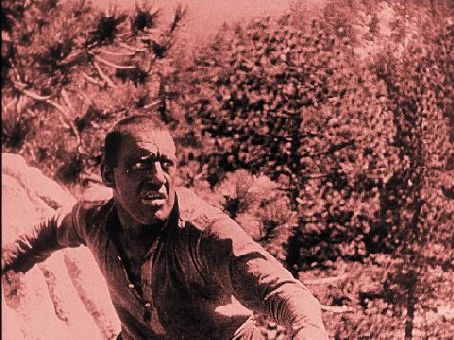The Birth of a Nation (1915) 
“The Fiery Cross of the Ku Klux Klan!”

Director: D. W. Griffith
Cast: Lillian Gish, Mae Marsh, Henry B. Walthall
Synopsis: The Civil War divides friends and destroys families, but that’s nothing compared to the anarchy in the black-ruled South after the war.
The Birth of a Nation isn’t an easy movie to review – or to watch. Not only because of its racist content, but because it’s the original template from which all future feature length films would be made, and so must also, by definition, stand as the raw prototype: feature film in its earliest experimental phase, a little ragged and undisciplined, even though it could have had no surer hand at the helm than that of D. W. Griffith. While Griffith is perhaps undeserving of the status of groundbreaking pioneer which is almost arbitrarily thrust upon him, he did mould all existing techniques of filmmaking into a coherent, universally understood language, and with The Birth of a Nation he proved that audiences were capable of coping with movies that were far longer than the standard 20 to 30 minute shorts to which they were accustomed.
Lillian Gish heads a large cast as Elsie, the winsome daughter of radical US congressman Austin Stoneman (Ralph Lewis), an active campaigner for the equality of blacks as the country finds itself embroiled in a Civil War, the outcome of which results in the assassination of President Lincoln (Joseph Henaberry). Before the war, the Stoneman’s are friendly with the Camerons from South Carolina, where black slavery is commonplace. The first half of the film uses the experiences of the two families to illustrate how the war split the nation, while the second half focuses on it’s aftermath – in particular, the opportunistic manner in which the newly emancipated blacks exploit their freedom to tyrannise the white population.
While The Birth of a Nation clearly deserves its place in film history, time has not been kind to it, and a wholesale shift in social attitudes regarding racism means that it has now come close to being something of an embarrassment. It is a constant reminder to the American nation that it once thought nothing of enslaving its fellow humans. And while its release attracted protests even back in 1915 – although primarily from Black groups – the movie reflects popular attitudes towards blacks – particular in the South – and Griffith’s own innate racism. To be fair to the director, he spent most of the rest of his career trying to atone for The Birth of a Nation, even editing the movie at one point into a more acceptable version. However, in a way, it is The Birth of a Nation’s blatant racism that contributes towards its value – although as a social document rather than a piece of art. After all, Hollywood has never operated in a cocoon – it’s very adept at identifying a gap in a market and exploiting it, or reflecting pre-existing trends.
The first half of The Birth of a Nation is relatively inoffensive, and largely free of the inconsistent pacing that troubles the movie’s second half. Usually, it’s the other way around, but in The Birth of a Nation the screenplay becomes increasingly disjointed and Griffith’s assurance deserts him as he struggles with a frankly ludicrous scenario. The very fabric of civilised society immediately begins to unravel with the emancipation of the slaves, who all become leering rapists and thugs intent on terrorising their former masters. The film’s hero, well played by Henry Walthall, sees a couple of white kids frightening four black children by hiding under a white sheet and pretending to be a ghost – and is inspired to found the notorious Ku Klux Klan. And while he and his cohorts are busy putting right all that the misguided Stoneman has made wrong, the Congressman himself is exposed as a hypocrite when he discovers his mulatto protege wishes to marry his daughter.
The movie looks beautiful, and is a testimony to just how far the industry had progressed since Griffith first began directing, just seven short years before its release. Billy Bitzer, his regular cameraman, is equally assured whether filming those breathtaking battle scenes or closing in on Ms. Gish’s winning features. Putting issues with racism to one side, The Birth of a Nation abides as a remarkably impressive piece of work because of the era in which it was made, but it’s protracted length – over three hours – and that problematic pacing means that probably only film buffs will manage to see it through to the very end.
(Reviewed 28th July 2012)
httpv://www.youtube.com/watch?v=vZ871wZd7UY
